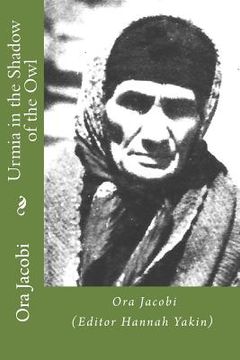Compartir
Urmia in the Shadow of the Owl (en Inglés)
Jacobi, Ora ; Yakin, Hannah ; Yakin, Hannah (Autor)
·
Createspace Independent Publishing Platform
· Tapa Blanda
Urmia in the Shadow of the Owl (en Inglés) - Jacobi, Ora ; Yakin, Hannah ; Yakin, Hannah
$ 112.162
$ 186.937
Ahorras: $ 74.775
Elige la lista en la que quieres agregar tu producto o crea una nueva lista
✓ Producto agregado correctamente a la lista de deseos.
Ir a Mis Listas
Origen: Estados Unidos
(Costos de importación incluídos en el precio)
Se enviará desde nuestra bodega entre el
Lunes 29 de Julio y el
Miércoles 07 de Agosto.
Lo recibirás en cualquier lugar de Colombia entre 1 y 5 días hábiles luego del envío.
Reseña del libro "Urmia in the Shadow of the Owl (en Inglés)"
At the beginning of World War I, the governor of Gawar warns Shlomo, a successful Jewish merchant, against the upcoming events on the Turko-Persian border. "Take your family and flee," he advises. "Robbers and looters do not distinguish between Jewish and Christian blood." Jewish Almaz and Assyrian Ishtar are separated at an early age. They both struggle to survive the Armenian-Assyrian Genocide. While Ishtar loses everything including her sanity, Almaz and her family find refuge in Mosul and later settle in Urmia, a town alternately invaded and devastated by the Turks, the Kurds, and the Russians. Determined to do the very best for her children, Almaz sends her daughter to a boys' school and buys a violin for her son, but refuses adamantly to give up the age-old right of women to choose partners for their offspring. Her struggle ends in Israel, where she arrives after the rebirth of the Jewish Homeland and dies within ten months. The Nash Didan (Our People) are a Jewish Community who have lived at the foot of Mount Ararat ever since the Babylonian Exile (Sixth century before the common era). They developed their own customs and spoke Leshan Didan, a Jewish Neo-Aramaic dialect. Today this language is only spoken by a handful of octogenarians in Israel and the U.S.

